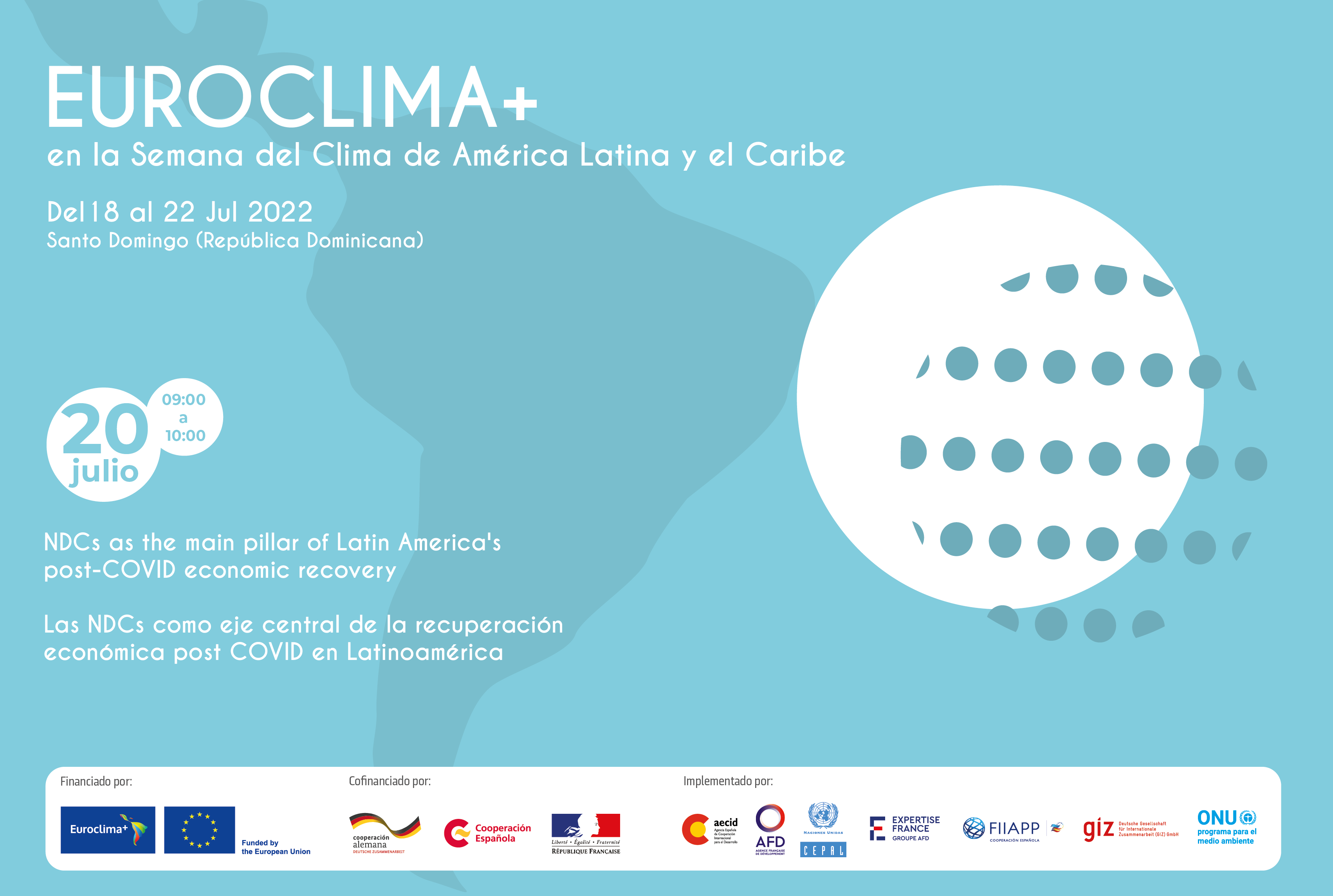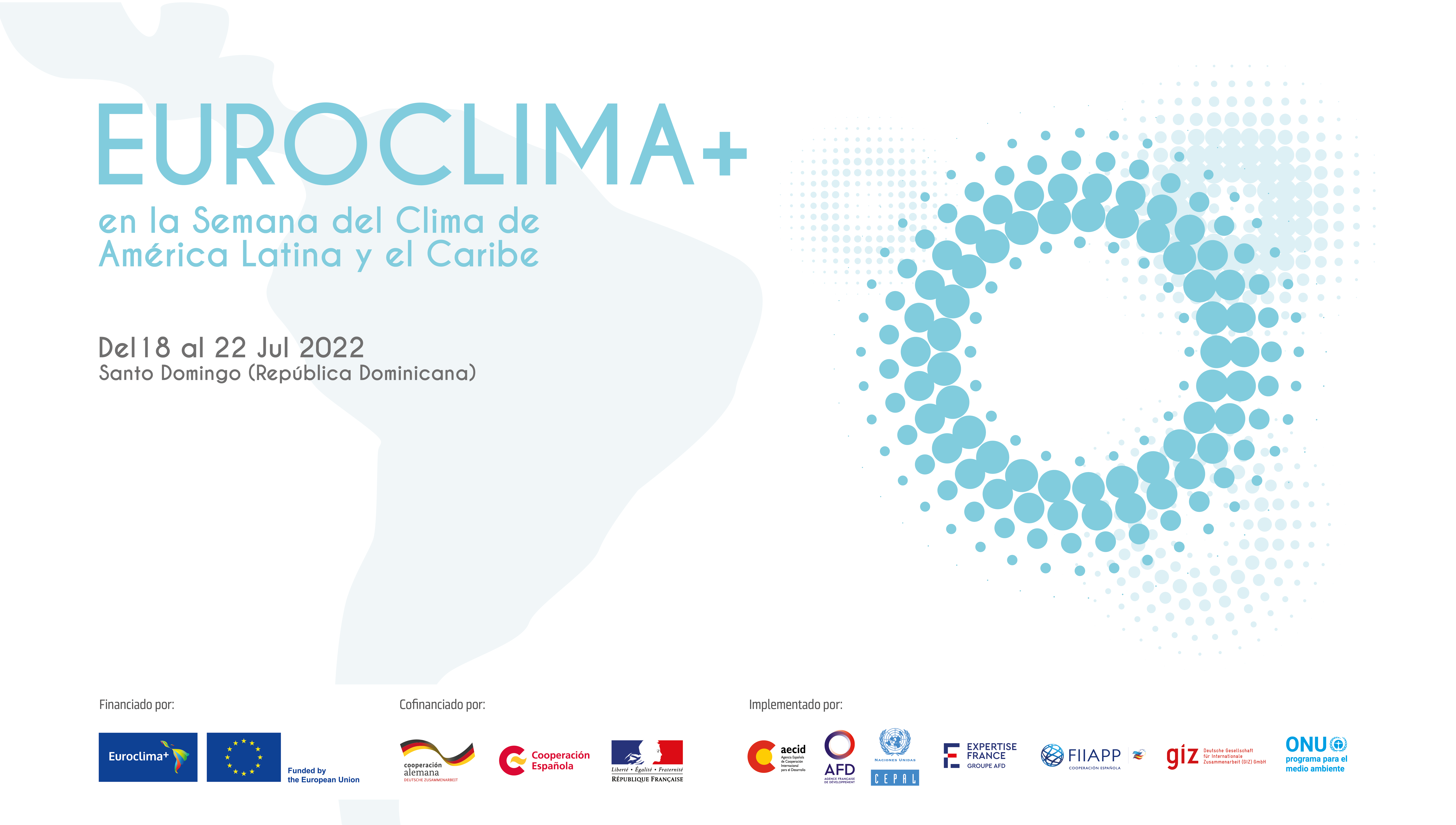The LACCW 2022 will be held from 18-22 July in Santo Domingo, Dominican Republic. Find out more about EUROCLIMA+ events.
The The Latin America and Caribbean Climate Week (LACCW 2022) will be held from 18-22 July in Santo Domingo, Dominican Republic. This event offers an opportunity to jointly advance climate action by integrating pandemic recovery. Regional collaboration was recognised in the Glasgow Climate Pact agreed at COP26 as an opportunity for governments and stakeholders to strengthen responses to climate change.
For this, EUROCLIMA+, the European Union's flagship programme on climate change in Latin America, will participate in LACCWW 2022 with nine events to showcase the progress and initiatives implemented in the region. These focus on demonstrating that climate action is possible and on presenting progress on sound adaptation and mitigation plans. They are also aligned to the overall thematic areas of the event:
- National actions and economy-wide approaches
- Integrated strategies for climate-resilient development
- How to take advantage of opportunities for transformation
The LACCW 2022 is organised by UN Climate Change and hosted by the Government of the Dominican Republic. It is the second of the regional 2022 Climate Weeks to be held throughout the year, before COP27 begins in Sharm el-Sheikh, Egypt, in November. With this event, governmental and non-governmental stakeholders will be able to address climate issues under the same framework and unity of purpose.

EUROCLIMA+ EVENTS AT LACCW 2022
- Cooperation for climate action: enhancing climate finance and investment in Latin America and CaribbeanEUROCLIMA
- EUROCLIMA: new horizons for the alliances between the European Union and Latin America and the Caribbean
- Communities of Learning ACE: Promoting capacities in ACE through climate competency
- The role of popular transport for the zero emissions target: case studies from Latin America and the Caribbean
- The NDCs as the backbone of Latin America’s post-COVID economic recovery
- Fulfilling National Climate Ambition in Latin America and the Caribbean: Improving the Coherence of the NDCs and National and Subnational Transport Planes
- Social pricing of carbon and public investment evaluation: applications in Latin American and Caribbean countries
- Regional dialogue: Consistency and articulation between NDCs and LTS, an opportunity for climate policy coherence in Latin America and the Caribbean
- Transforming development and business: tools for aligning public and private climate strategies
NDCs as the backbone of Latin America’s post-COVID economic recovery

Date and time: 20 July, 09:00 - 10:00 (Dominican Republic time)
The event will start with a presentation of the NDC Partnership on the "Economic Advisors Initiative", created in order to put NDCs at the heart of the post-COVID economic recovery. GIZ/EUROCLIMA+ will then present the experience of implementing this initiative at the regional level, analysing the cases of the Dominican Republic and Ecuador, regarding opportunities, challenges and lessons learned. The event will continue with a panel discussion by representatives from the government sector and/or economic advisors, who will discuss and share lessons learned on the process of planning for green recovery and the challenges of planning for it, in order to promote other countries in the region to orient their climate commitments towards sustainable recovery. To analyse the event, publications on green recovery will be shared to promote knowledge management on the subject and disseminate the importance of its articulation with national climate action.
Cooperation for climate action: enhancing climate finance and investment in Latin America and the Caribbean

Date and time: 20 July, 11:00-12:00 (Dominican Republic time)
LAC is one of the regions most vulnerable to climate-related impacts, particularly Developing Small Island States, which are increasingly exposed to extreme events that threaten their natural resource base and undermine the livelihoods of their people. According to a recent IDB study, responding to the climate crisis in LAC will require US$472 billion to US$1,281 billion annually, which will imply aligning a total of 5% to 19% of annual GDP with sustainable, resilient and decarbonised development goals. This session aims to discuss opportunities for technical and financial cooperation to support the mobilisation of financial flows to enhance climate action in the region.
More information on the event
EUROCLIMA: new horizons for alliances between the European Union, Latin America and the Caribbean

Date and time: 20 July, 12:00-13:00 (Dominican Republic time)
After more than 10 years of promoting partnerships in Latin America and the Caribbean to address the climate change crisis, the European Union, through EUROCLIMA, will present a balance of its actions in the region and the characteristics and priorities that the Programme will develop in the framework of the new Global Europe financial instrument for the period 2021-2027.
ACE Learning Communities: Promoting capacities on ACE through climate competency

Date and time: 20 July, 16:30-17:30 (Dominican Republic time)
The event’s objective is to share the main keys in the promotion of capacities towards Action for Climate Empowerment, through the EURCOCLIMA+ proposal called "The Climate Competence", which is the result of the collaborative work of 18 countries in the region. These countries are members of the Community of Practical Learning on ACE of the Euroclima+ programme: Two lines of content:- Space for collective intelligence and promotion of innovative actions in ACE training in the region. - Socialising new transformative frameworks: Climate Competence. The proposed format is a dynamic and interactive presentation of 15 minutes on the main characteristics of climate competencies and another 10 minutes to disseminate best practices in training and capacity building for ACE through an open dialogue and an assembly format with the attendees. In total, the HUB on ACE will last approximately 25 minutes.
Social pricing of carbon and public investment evaluation: applications in Latin American and Caribbean countries

Date and time: Wednesday, 20 July, 17:00-18:00 (Dominican Republic time)
This side event will present the regional initiative promoted by ECLAC and the EUROCLIMA+ Programme on the inclusion of the social price of carbon in the evaluation of public investment. National authorities and technicians from Latin American and Caribbean countries, linked to the National Public Investment Systems and the Ministries of Finance, will share their experiences in the use of the social price of carbon in the evaluation of public investment, their contribution to the fulfilment of decarbonisation targets in the countries and in general for moving towards more sustainable and low-carbon development styles in the region. Similarly, this event will feature a panel where Directors of National Public Investment Systems from countries in the region will be invited to share their thoughts on the challenges and opportunities to advance the implementation of social carbon pricing instruments.
The role of popular transport for the zero emissions target: case studies from Latin America and the Caribbean

Date and time: 21 July, 09:00 - 10:00(Dominican Republic time)
As the world makes an urgent transition to a low-emission economy, transport emissions must be drastically reduced, while ensuring that all people have adequate access to mobility to reach jobs, services, healthcare and other daily needs. In LAC, 35% of greenhouse gas emissions from fuel combustion come from the transport sector, significantly higher figure than the global average of 22%. Informal transport, a critical provider of mobility for millions of people in the region, including the most vulnerable populations, will therefore play an essential role in the transition to sustainable, low-carbon transport that leaves no one behind. This event will explore case studies and lessons learned from LAC on how informal transport can support the transition to a low-carbon economy through issues such as the electrification of informal transport systems and their integration with public transport systems. It will also provide an important space for South-South exchange.
Regional dialogue: Consistency and articulation between NDCs and LTS, an opportunity for climate policy coherence in Latin America and the Caribbean
Date and time: 21 July, 09:00-16:00 (Dominican Republic time)
In the LAC region, challenges have been identified to ensure policy coherence and transparency in NDCs and LTS. The main challenges are related to the metrics applied to the monitoring of actions, access to finance, the incorporation of adaptation actions and clarity in addressing cross-cutting issues such as gender and just transition. For these reasons, it is proposed to advance in the framework of the LACCW a dialogue among stakeholders on addressing these challenges, which will seek to promote an interactive exchange among the participants on lessons learned, solutions and opportunities for achieving climate planning consistent with and serving climate objectives.
The segments that will comprise the session are:
- Segment on accounting for climate goals
- Segment on adaptation
- Segment on financing
- Segment on cross-cutting themes applied to the two instruments
More information on the event
Download Concept Note
Meeting National Climate Ambition in Latin America and the Caribbean: Improving the Coherence of NDCs and National and Subnational Transport Plans

Date and time: 21 July, 11:30-12:30 (Dominican Republic time)
GHG emissions from transport account for more than one third of emissions from fuel combustion in Latin America and the Caribbean. Therefore, to meet regional climate targets, it is essential that governments address transport emissions in national climate plans, including the Paris Agreement's Nationally Determined Contributions (NDCs). Many countries in the region have already taken this important step, but as transport emissions continue to grow rapidly, clear roadmaps and action plans are needed to support the fulfilment of climate ambition for transport. National Urban Mobility Plans (NUMPs), which are action-oriented strategic frameworks for urban mobility that aim to improve the capacity of cities to plan, finance and implement sustainable low-carbon transport projects and measures, are a promising tool for supporting this compliance. This event will explore the role of NUMPs in meeting transport ambitions in NDCs, using case studies from the region.
Transforming development and businesses: tools for aligning public and private climate strategies

Date and time: 21 July, 14:00-15:00 (Dominican Republic time)
The objective of the event is to present experiences of Latin American countries in the development of processes and tools to align business strategies with national and global climate goals, contributing to the transformation of business models and leading the development of their countries towards a path of resilience and decarbonisation. The factors that have enabled these processes, the challenges they have encountered and the opportunities for replication, from the perspective of government, the private sector and international cooperation, will be discussed. A practical guide for aligning private sector climate action with national strategies and goals will also be presented, which has been formulated with input from members of the Community of Practice on Public-Private Articulation for Climate Action (ArticuLAC), a joint initiative of the EUROCLIMA+ programme, through GIZ, the LEDS LAC Platform and the INCAE Business School.
About EUROCLIMA+
EUROCLIMA+ is a programme funded by the European Union and co-financed by the German federal government through the Federal Ministry for Economic Cooperation and Development (BMZ), as well as by the governments of France and Spain through the Ministry of Foreign Affairs, European Union and Cooperation.
The Programme's mission is to reduce the impact of climate change and its effects in 18 countries in Latin America and the Caribbean, promoting mitigation, adaptation, resilience and climate investment. It is implemented according to the "Spirit of Team Europe" under the synergistic work of seven agencies: the Spanish Agency for International Development Cooperation (AECID), the French Development Agency (AFD), the Economic Commission for Latin America and the Caribbean (ECLAC), Expertise France (EF), the International and Ibero-America Foundation for Administration and Public Policy (FIIAPP), the German Society for International Cooperation (GIZ) GmbH and the UN Environment Programme (UNEP).
For more information:
This email address is being protected from spambots. You need JavaScript enabled to view it.euroclimaplus.org


